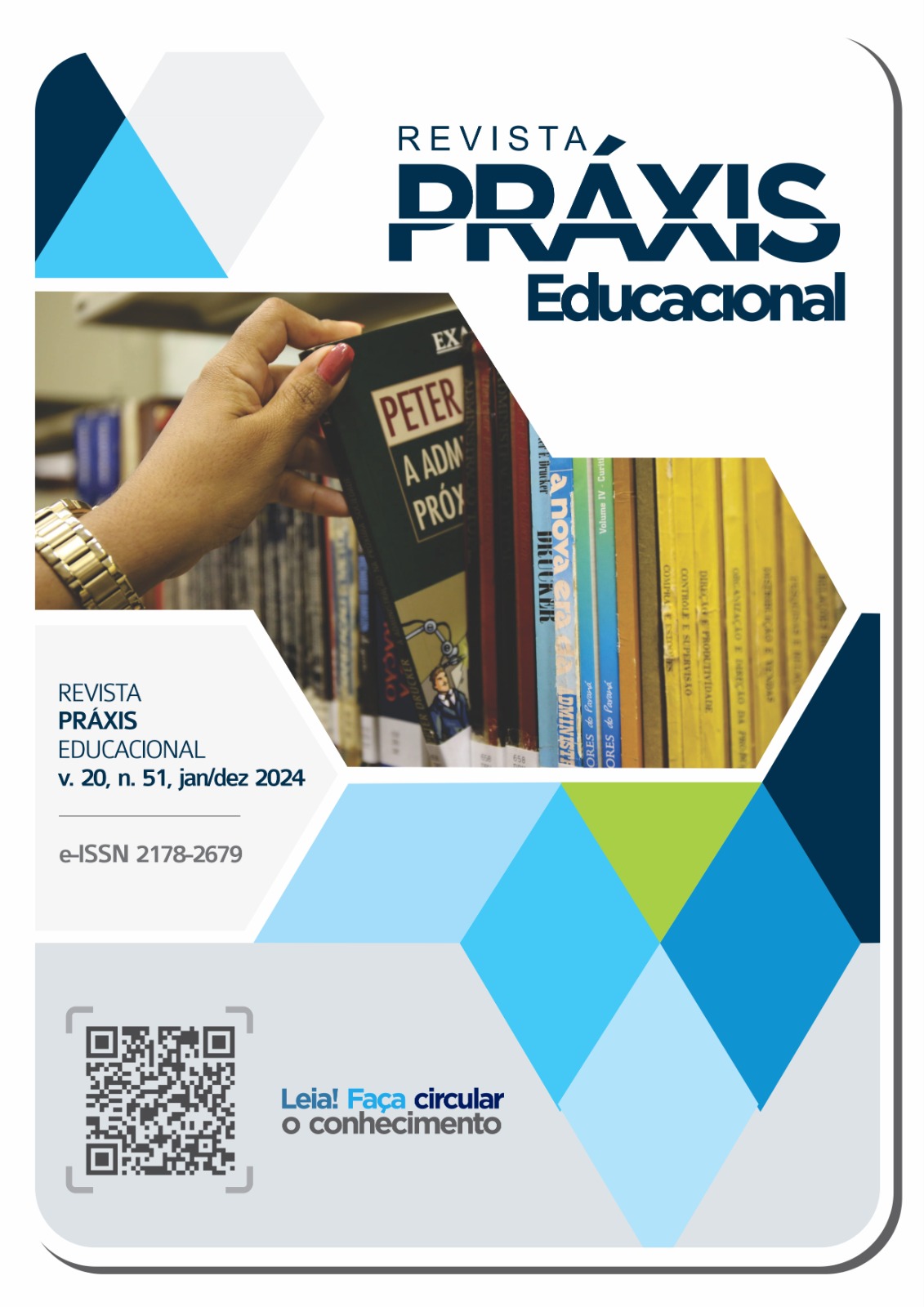Historical and philosophical outlines of a current pedagogical art of early childhood education
DOI:
https://doi.org/10.22481/praxisedu.v20i51.11532Keywords:
early childhood education, Michel Foucault, modern educational thinking, Comenius, RousseauAbstract
The article aims to analyze the philosophical and historical outlines that support the educational practices developed with 4 and 5 years old children enrolled in preschool classes. It takes as an analytical corpus the methodological strategies which are reported by teachers in the Revista Pátio Educação Infantil from 2014 to 2018. It is assumed the perspective of foucaultian studies and it is inspired by effective history to trace a brief genealogical history of modern pedagogical thinking, in order to find some clues about the composition of the forces that taught us the ways in which we carry out our practices of early childhood education today. Thereby, revisiting the sayings of Modern Pedagogy thinkers Jan Amos Comenius and Jean Jacques Rousseau, pointing them out as initiators of discursivity about the ways in which we assume contemporary pedagogical thinking. It aims to give visibility to current practices when talking about early childhood education and tries to understand how these practices have been engendered and constituted throughout the history of Pedagogy leading to the emergence of a current pedagogical art, which is understood as an update of the principles of the Comenian art of teaching and the Rousseauian art of educating.
Downloads
Metrics
References
BOUTIN, Aldamara. Formando novos pensadores. Pátio Educação Infantil. Porto Alegre: Grupo A Educação S.A, ano XIV. n. 48, p. 32-34, jul./set. 2016.
BRASIL. Lei 11.274, de 6 de fevereiro de 2006. Altera a redação dos arts. 29, 30, 32 e 87 da Lei nº 9.394, de 20 de dezembro de 1996, que estabelece as diretrizes e bases da educação nacional, [...]. Brasília: Presidência da República, 2006. Disponível em: http://www.planalto.gov.br/ccivil_03/_ato2004-2006/2006/lei/l11274.htm. Acesso em: 15 jun.2023.
CAMBI, Franco. História da Pedagogia. 2ª. ed. São Paulo: Fundação Editora da UNESP (FEU), 2002.
CANGUSSU, Lilian. Conhecer para não repetir. Pátio Educação Infantil. Porto Alegre: Grupo A Educação S.A, ano 15, n. 52, p. 32-35, jul./set. 2017.
CARDOSO, Izabela. Compartilhado saberes e sabores da natureza. Pátio Educação Infantil. Porto Alegre: Grupo A Educação S.A, ano XIII, n. 45, p. 28-31, out./dez. 2015.
COMENIUS, Jan Amos. Didática Magna. 4ª ed. São Paulo: Martins Fontes, 2011.
EVANGELISTA, Marcia Nico; COSTA DE PAULA, Maria de Fátima. Currículo e Produção de Subjetividades. Revista Práxis Educacional, Vitória da Conquista, v. 15, n. 33, p. 186-207, jul./set. 2019. DOI: 10.22481/praxisedu.v15i33.5282. Disponível em https://periodicos2.uesb.br/index.php/praxis/article/view/5282/3967 Acesso em 15 jun. 2023.
FOUCAULT, Michel. O que é um autor? In: FOUCAULT, Michel. Ditos e Escritos III: Estética: Literatura e Pintura, Música e Cinema. 4.ed. Rio de Janeiro: Forense Universitária, 2015. p. 264-298.
FOUCAULT, Michel. Microfísica do poder. 13ª. ed. São Paulo: Paz e Terra, 2021.
FOUCAULT, Michel. Segurança, Território e População. São Paulo: Martins Fontes, 2008.
GARCIA, Maria Manuela Alves. Quimeras do Curso de Pedagogia:
a formação para a docência na Educação Infantil e nos Anos Iniciais. Revista Práxis Educacional, Vitória da Conquista, v. 15, n.33, p. 91-117, jul./set. 2019. DOI: 10.22481/praxisedu.v15i33.5278. Disponível em https://periodicos2.uesb.br/index.php/praxis/article/view/5278/4000 Acesso em 15 jun. 2023.
HENNING, Paula Corrêa; FERRARO, José Luis. A relação escola-estado: provocações de nietzsche e foucault para pensarmos nossa atualidade. Educação em Revista, v. 38, 2022. DOI: 10.1590/0102-469822033. Disponível em: https://periodicos.ufmg.br/index.php/edrevista/article/view/22033. Acesso em: 05 jun. 2024.
NARODOWSKI, Mariano. El paradigma comeniano. El final de las utopias educacionales. Um adiós sin penas ni olvidos. 2013. Disponível em https://archivo.argentina.indymedia.org/uploads/2012/07/el_final_de_las_utopias_educativas._un_adios_sin_penas_ni_olvidos.pdf Acesso em 15 jun. 2023.
NARODOWSKI, Mariano. Comenius & a Educação. 2ª ed. Belo Horizonte: Autêntica, 2007.
NOGUERA-RAMÍREZ, Carlos Ernesto. El gobierno pedagógico. Del arte de educar a las tradiciones pedagógicas. Bogotá: Siglo del Hombre Editores y Grupo Historia de la Práctica Pedagógica, 2012.
PEREIRA, Cíntia Beatriz Machado. Arte de ludicidade no jardim das sensações. Pátio Educação Infantil. Porto Alegre: Grupo A Educação S.A, ano XIII, n. 43, p. 34-37, abr./jun. 2015.
POLTRONIERI, Érica. O desertar de um olhar sensível. Pátio Educação Infantil. Porto Alegre: Grupo A Educação S.A, ano XIV, n. 46, p. 28- 31, jan./mar. 2016.
ROUSSEAU, Jean Jacques. Emílio, ou Da Educação. 4. ed. São Paulo: Martins Fontes, 2018.
SILVA, Gisele Ruiz; HENNING, Paula Corrêa. Sujeito-infantil-escolarizado: relações de poder-saber no gerenciamento de uma população. Perspectiva, [S. l.], v. 37, n. 3, p. 973–991, 2019. DOI: 10.5007/2175-795X.2019.e55569. Disponível em: https://periodicos.ufsc.br/index.php/perspectiva/article/view/2175-795X.2019.e55569. Acesso em: 05 jun. 2024.
STRECK, Danilo. Rousseau e a Educação. 2. ed. Belo Horizonte: Autêntica, 2008.
TELLES, Márcia. Ler para aprender e se divertir. Pátio Educação Infantil. Porto Alegre: Grupo A Educação S.A, ano 15, n. 51, p. 32-35, abr./jun. 2017.
VARELA, Julia. O estatuto do saber pedagógico. In: SILVA, Tomaz Tadeu da. O sujeito da educação: estudos foucaultianos. 7. ed. Petrópolis, RJ: Vozes, 2010. p. 87-96.
Downloads
Published
How to Cite
Issue
Section
License
Copyright (c) 2024 Práxis Educacional

This work is licensed under a Creative Commons Attribution 4.0 International License.
You are free to:
Share - copy and redistribute the material in any medium or format; Adapt - remix, transform, and build from the material for any purpose, even commercially. This license is acceptable for Free Cultural Works. The licensor cannot revoke these freedoms as long as you follow the terms of the license.
Under the following terms:
Attribution - You must appropriately give credit, provide a link to the license, and indicate if any changes have been made. You may do so in any reasonable way, but not in a way that suggests that you or your use is endorsed by the licensor.
There are no additional restrictions - You cannot apply legal terms or technological measures that legally restrict others to make any use permitted by the license.










